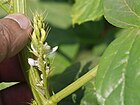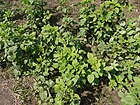Note: This is a project under development. The articles on this wiki are just being initiated and broadly incomplete. You can Help creating new pages.
Difference between revisions of "Cyamopsis tetragonoloba"
| (2 intermediate revisions by the same user not shown) | |||
| Line 1: | Line 1: | ||
| − | + | [[File:Cyamopsis tetragonoloba (4663783848).jpg|thumb|right]] | |
| − | + | '''Cyamopsis tetragonoloba''' is an erect, herbaceous annual to perennial plant. It grows up to 300cm tall. The plant is the source of guar gum. The plant is also a local source of food. It is often cultivated in India and southeastern Asia for its seeds and seedpods, which are also used as a food. | |
==Uses== | ==Uses== | ||
| − | {{Uses| | + | {{Uses|Blood sugar level problems}}. |
==Parts Used== | ==Parts Used== | ||
| Line 17: | Line 17: | ||
===Dravya=== | ===Dravya=== | ||
===Rasa=== | ===Rasa=== | ||
| − | |||
===Guna=== | ===Guna=== | ||
| Line 30: | Line 29: | ||
==Habit== | ==Habit== | ||
| − | {{Habit|}} | + | {{Habit|Perennial}} |
==Identification== | ==Identification== | ||
| Line 49: | Line 48: | ||
==Mode of Propagation== | ==Mode of Propagation== | ||
| − | {{Propagation|}} | + | {{Propagation|Seeds}} |
==How to plant/cultivate== | ==How to plant/cultivate== | ||
| − | <ref name="How to plant/cultivate"/> | + | Cyamopsis tetragonoloba is suitable for growing in the warm temperate zone as an annual, although it is more commonly grown in lowland tropical and subtropical areas up to an elevation of 1,000 metres.<ref name="How to plant/cultivate"/> |
==Commonly seen growing in areas== | ==Commonly seen growing in areas== | ||
| Line 59: | Line 58: | ||
==Photo Gallery== | ==Photo Gallery== | ||
<gallery class="left" caption="" widths="140px" heights="140px"> | <gallery class="left" caption="" widths="140px" heights="140px"> | ||
| − | + | Cyamopsis tetragonoloba (4663783848).jpg | |
| + | Gavaar (Marathi- गवार) (4663162909).jpg | ||
| + | Gawar Phali With Aaloo (Guar Bean With Potatoes).JPG | ||
| + | Goru-chikkudu-kaya (Telugu- గోరుచిక్కుడుకాయ) (4663152727).jpg | ||
</gallery> | </gallery> | ||
| Line 65: | Line 67: | ||
<references> | <references> | ||
| − | <ref name="chemical composition">[" | + | <ref name="chemical composition">[Chemistry]</ref> |
| + | |||
| + | <ref name="Leaf">[Morphology]</ref> | ||
| − | <ref name=" | + | <ref name="How to plant/cultivate">[Cultivation]</ref> |
| − | |||
| − | |||
</references> | </references> | ||
| Line 76: | Line 78: | ||
* [ ] | * [ ] | ||
* [ ] | * [ ] | ||
| − | + | ||
[[Category:Herbs]] | [[Category:Herbs]] | ||
[[Category:Pages without herbs images]] | [[Category:Pages without herbs images]] | ||
Latest revision as of 16:10, 21 April 2020
Cyamopsis tetragonoloba is an erect, herbaceous annual to perennial plant. It grows up to 300cm tall. The plant is the source of guar gum. The plant is also a local source of food. It is often cultivated in India and southeastern Asia for its seeds and seedpods, which are also used as a food.
Contents
- 1 Uses
- 2 Parts Used
- 3 Chemical Composition
- 4 Common names
- 5 Properties
- 6 Habit
- 7 Identification
- 8 List of Ayurvedic medicine in which the herb is used
- 9 Where to get the saplings
- 10 Mode of Propagation
- 11 How to plant/cultivate
- 12 Commonly seen growing in areas
- 13 Photo Gallery
- 14 References
- 15 External Links
Uses
Parts Used
[[:Category:Herbs with used in medicine|]], stem, leaves, Root.
Chemical Composition
Common names
| Language | Common name |
|---|---|
| Kannada | |
| Hindi | |
| Malayalam | |
| Tamil | |
| Telugu | |
| Marathi | |
| Gujarathi | |
| Punjabi | |
| Kashmiri | |
| Sanskrit | |
| English |
Properties
Reference: Dravya - Substance, Rasa - Taste, Guna - Qualities, Veerya - Potency, Vipaka - Post-digesion effect, Karma - Pharmacological activity, Prabhava - Therepeutics.
Dravya
Rasa
Guna
Veerya
Vipaka
Karma
Prabhava
Habit
Identification
Leaf
| Kind | Shape | Feature |
|---|---|---|
Flower
| Type | Size | Color and composition | Stamen | More information |
|---|---|---|---|---|
| {{{5}}} |
Fruit
| Type | Size | Mass | Appearance | Seeds | More information |
|---|---|---|---|---|---|
Other features
List of Ayurvedic medicine in which the herb is used
Where to get the saplings
Mode of Propagation
How to plant/cultivate
Cyamopsis tetragonoloba is suitable for growing in the warm temperate zone as an annual, although it is more commonly grown in lowland tropical and subtropical areas up to an elevation of 1,000 metres.[3]
Commonly seen growing in areas
[[:Category:Herbs that are commonly seen in the region of |]], [[:Category:Herbs that are commonly seen in the region of |]], [[:Category:Herbs that are commonly seen in the region of |]], [[:Category:Herbs that are commonly seen in the region of |]], [[:Category:Herbs that are commonly seen in the region of |]].
Photo Gallery
References
External Links
- [ ]
- [ ]
- Ayurvedic Herbs known to be helpful to treat Blood sugar level problems
- Herbs with used in medicine
- Herbs with stem used in medicine
- Herbs with leaves used in medicine
- Herbs with Root used in medicine
- Habit - Perennial
- Index of Plants which can be propagated by Seeds
- Herbs that are commonly seen in the region of
- Herbs
- Pages without herbs images




